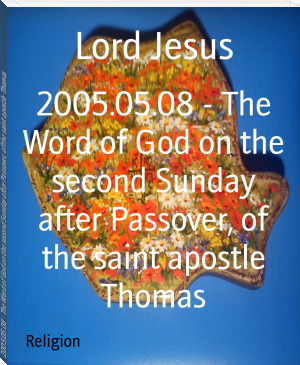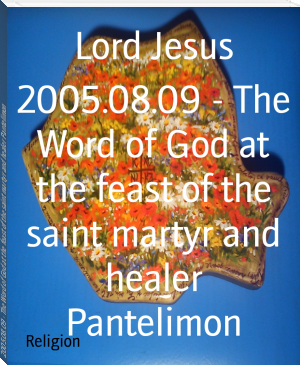The Story of a Soul - Saint Thérèse de Lisieux (best color ereader .TXT) 📗

- Author: Saint Thérèse de Lisieux
- Performer: -
Book online «The Story of a Soul - Saint Thérèse de Lisieux (best color ereader .TXT) 📗». Author Saint Thérèse de Lisieux
1894
You are like some little village maiden who, when sought in marriage by a mighty king would not dare to accept him, on the plea that she is not rich enough, and is strange to the ways of a court. But does not her royal lover know better than she does, the extent of her poverty and ignorance?
Marie, though you are nothing, do not forget that Jesus is All.
You have only to lose your own nothingness in that Infinite All,
and thenceforth to think only of that All who alone is worthy of
your love.
You tell me you wish to see the fruit of your efforts. That is exactly what Jesus would hide from you. He likes to contemplate by Himself these little fruits of our virtue. They console Him.
You are quite wrong, Marie, if you think that Thérèse walks eagerly along the way of Sacrifice: her weakness is still very great, and every day some new and wholesome experience brings this home more clearly. Yet Jesus delights to teach her how to glory in her infirmities.[2] It is a great grace, and I pray Him to give it to you, for with it come peace and tranquillity of heart. When we see our misery we do not like to look at ourselves but only upon our Beloved.
You ask me for a method of obtaining perfection. I know of Love—and Love only! Our hearts are made for this alone. Sometimes I endeavour to find some other word for love; but in a land of exile "words which have a beginning and an end"[3] are quite unable to render adequately the emotions of the soul, and so we must keep to the one simple word—LOVE.
But on whom shall our poor hearts lavish this love, and who will be worthy of this treasure? Is there anyone who will understand it and—above all—is there anyone who will be able to repay? Marie, Jesus alone understands love: He alone can give back all—yea, infinitely more than the utmost we can give. _____________________________
[1] The allusion is to the scruples from which Marie suffered. Having read this letter—which is a strong plea for Frequent Communion—Pope Pius X declared it "most opportune." Thérèse was but fifteen when she wrote it. [Ed.]
[2] 2 Cor. 11:5.
[3] St. Augustine.
_____________________________
LETTER TO HER COUSIN, JEANNE GUÉRIN (MADAME LA NÉELE)August, 1895.
It is a very great sacrifice that God has asked of you, my dear Jeanne, in calling your little Marie to the Carmel; but remember that He has promised a hundredfold to anyone who for His Love hath left father or mother or sister.[1] Now, for love of Jesus, you have not hesitated to part with a sister dearer to you than words can say, and therefore He is bound to keep His promise. I know that these words are generally applied to those who enter the religious life, but my heart tells me they were spoken, too, for those whose generosity is such that they will sacrifice to God even the loved ones they hold dearer than life itself. _____________________________
[1] Mark 10:30.
_____________________________
LETTERS TO HER BROTHER MISSIONARIES I1895.
Our Divine Lord asks no sacrifice beyond our strength. At times, it is true, He makes us taste to the full the bitterness of the chalice He puts to our lips. And when He demands the sacrifice of all that is dearest on earth, it is impossible without a very special grace not to cry out as He did during His Agony in the Garden: "My Father, let this chalice pass from me!" But we must hasten to add: "Yet not as I will, but as Thou wilt."[1] It is so consoling to think that Jesus, "the Strong God,"[2] has felt all our weaknesses and shuddered at the sight of the bitter chalice—that very chalice He had so ardently desired.
Your lot is indeed a beautiful one, since Our Lord has chosen it for you, and has first touched with His own Lips the cup which He holds out to yours. A Saint has said: "The greatest honour God can bestow upon a soul is not to give to it great things, but to ask of it great things." Jesus treats you as a privileged child. It is His wish you should begin your mission even now,[3] and save souls through the Cross. Was it not by suffering and death that He ransomed the world? I know that you aspire to the happiness of laying down your life for Him; but the martyrdom of the heart is not less fruitful than the shedding of blood, and this martyrdom is already yours. Have I not, then, good reason to say that your lot is a beautiful one—worthy an apostle of Christ?
II1896.
Let us work together for the salvation of souls! We have but the one day of this life to save them, and so give to Our Lord a proof of our love. To-morrow will be Eternity, then Jesus will reward you a hundredfold for the sweet joys you have given up for Him. He knows the extent of your sacrifice. He knows that the sufferings of those you hold dear increase your own; but He has suffered this same martyrdom for our salvation. He, too, left His Mother; He beheld that sinless Virgin standing at the foot of the Cross, her heart pierced through with a sword of sorrow, and I hope he will console your own dear mother. . . . I beg Him most earnestly to do so.
Ah! If the Divine Master would permit those you are about to leave for His Love but one glimpse of the glory in store, and the vast retinue of souls that will escort you to Heaven, already they would be repaid for the great sacrifice that is at hand.
IIIFebruary 24, 1896.
Please say this little prayer for me each day; it sums up all my desires:
"Merciful Father, in the name of Thy sweet Jesus, of the Blessed
Virgin, and all the Saints, I beg Thee to consume my sister with
Thy spirit of love, and to grant her the grace to make Thee
greatly loved."
If Our Lord takes me soon to Himself, I ask you still to continue this prayer, because my longing will be the same in Heaven as upon earth: to love Jesus and to make Him loved.
IV. . . . . . .
All I desire is God's Holy Will, and if in Heaven I could no longer work for His glory, I should prefer exile to Home.
VJune 21, 1897
You may well sing of the Mercies of God! They shine forth in you with splendour. You love St. Augustine and St. Mary Magdalen, those souls to whom many sins were forgiven because they loved much. I love them too; I love their sorrow, and especially their audacious love. When I see Mary Magdalen come forth before all Simon's guests to wash with her tears her Master's Feet—those Feet that for the first time she touches—I feel her heart has fathomed that abyss of love and mercy, the Heart of Jesus; and I feel, too, that not only was He willing to forgive, but even liberally to dispense the favours of a Divine and intimate friendship, and to raise her to the loftiest heights of prayer.
My Brother, since I also have been given to understand the Love of the Heart of Jesus, I confess that all fear has been driven from mine. The remembrance of my faults humbles me; and it helps me never to rely upon my own strength—which is but weakness—but more than all, it speaks to me of mercy and of love. When a soul with childlike trust casts her faults into Love's all-devouring furnace, how shall they escape being utterly consumed?
I know that many Saints have passed their lives in the practice of amazing penance for the sake of expiating their sins. But what of that? "In my Father's house there are many mansions."[4] These are the words of Jesus, and therefore I follow the path He marks out for me; I try to be nowise concerned about myself and what Jesus deigns to accomplish in my soul.
VI1897.
On this earth where everything changes, one thing alone does never change—our Heavenly King's treatment of His friends. From the day He raised the standard of the Cross, in its shadow all must fight and win. "The life of every missionary abounds in crosses," said Théophane Vénard. And again: "True happiness consists in suffering, and in order to live we must die."
Rejoice, my Brother, that the first efforts of your Apostolate are stamped with the seal of the Cross. Far more by suffering and by persecution than by eloquent discourses does Jesus wish to build up His Kingdom.
You are still—you tell me—a little child who cannot speak. Neither could Father Mazel, who was ordained with you, and yet he has already won the palm . . . Far beyond our thoughts are the thoughts of God! When I learnt that this young missionary had died before he had set foot on the field of his labours, I felt myself drawn to invoke him. I seemed to see him amidst the glorious Martyr choir. No doubt, in the eyes of men he does not merit the title of Martyr, but in the eyes of God this inglorious death is no less precious than the sacrifice of him who lays down his life for the Faith.
Though one must be exceeding pure before appearing in the sight of the All-Holy God, still I know that He is infinitely just, and this very Justice which terrifies so many souls is the source of all my confidence and joy. Justice is not only stern severity towards the guilty; it takes account of the good intention, and gives to virtue its reward. Indeed I hope as much from the Justice of God as from His Mercy. It is because He is just, that "He is compassionate and merciful, longsuffering, and plenteous in mercy. For He knoweth our frame, He remembereth that we are dust. As a father hath compassion on his children, so hath the Lord compassion on us."[5]
O my Brother, after these beautiful and consoling words of the
Royal Prophet, how can we doubt God's power to open the gates of
His Kingdom to His children who have loved Him unto perfect
sacrifice, who have not only left home and country so as to make
Him known and loved, but even long to lay down their lives for
Him? . . . Jesus said truly there is no greater love than this.
Nor will He be outdone in generosity. How could He cleanse in the
flames of Purgatory souls consumed with the fire of Divine Love?
I have used many words to express my thought, and yet I fear I have failed. What I wish to convey is, that in my opinion all missionaries are Martyrs by will and desire, and not even one should pass through the purifying flames.
This, then, is what I think about the Justice of God; my own way is all confidence and love, and I cannot understand those souls who are afraid of so affectionate a Friend. Sometimes, when I read books in which perfection is put before us with the goal obstructed by a thousand obstacles, my poor little head is quickly fatigued. I close the learned treatise, which tires my brain and dries up my heart, and I turn to the Sacred Scriptures. Then all becomes clear and lightsome—a single word opens out infinite vistas, perfection appears easy, and I see that it is enough to acknowledge our nothingness, and like children surrender ourselves into the Arms of the Good God. Leaving to great and lofty minds the beautiful books which I cannot understand, still less put in practice, I rejoice in my littleness because "only little children and those who are like them shall be admitted to the Heavenly banquet."[6] Fortunately—"there are many mansions in my Father's House":[7] if there were only those—to me—incomprehensible mansions with their baffling roads, I should certainly never enter there . . .
VIIJuly 13, 1897.
Your soul is too





Comments (0)